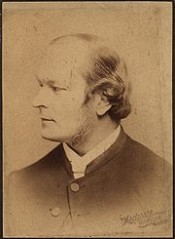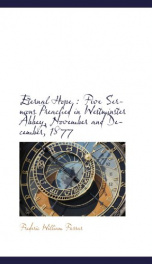Farrar Frederic William

Frederic William Farrar (1831 - 1903), often known as Dean Farrar, was a theological writer. Farrar was born in Bombay, India and educated at King William's College in the Isle of Man, King's College London and Trinity College, Cambridge.[1] At Cambridge he won the Chancellor's Gold Medal for poetry in 1852.[2] He was for some years a master at Harrow School, and from 1871-76 Master (headmaster) of Marlborough College. He became successively Canon of Westminster and Rector of St. Margaret's, Archdeacon of Westminster and Dean of Canterbury. He was an eloquent preacher and a voluminous author, his writings including stories of school life, such as Eric, or, Little by Little and St. Winifred's, a Life of Christ (1874), which had great popularity, a Life of St. Paul (1879), and two historical romances. His works were translated into many languages, especially Life of Christ. He was a believer in universal reconciliation and thought that all people would eventually be saved, a view he promoted in a series of 1877 sermons.[3] He originated the term "abominable fancy" for the longstanding Christian idea that the eternal punishment of the damned would entertain the saved.[4] Farrar published Eternal Hope in 1878 and Mercy and Judgment in 1881, both of which defend Christian universalism at length.[5][6] His daughter, Maud, was the mother of World War II British field marshal Bernard Montgomery. Farrar has a street named after him - Dean Farrar Street in Westminster, London. In 2007 the top two storeys of a building on this street collapsed, in the 2007 Dean Farrar Street collapse. This article incorporates public domain text from: Cousin, John William (1910). A Short Biographical Dictionary of English Literature. London, J. M. Dent & sons; New York, E. P. Dutton.
do you like this author?
What readers are saying
What do you think? Write your own comment on this book!
write a commentWhat readers are saying
What do you think? Write your own comment on this author!
write a commentBook list

st winifreds or the world of school
Series:
Unknown
Year:
Unknown
Raiting:
3/5
"Well then, after that I was nearly caught. I think, Walter, that even you would be a coward if you had such long long frights. You know that to get to Dan's, after the gates are locked, the only way is to go over the railing, and through Dr Lane's garden, and I'm always frightened to death lest his great dog should be loose, and should catch hold of me. He did growl last night. And then as I was hurrying back--you know it was rather moonlight last night, and not very cold--and who should I see but the Doctor himself walking up and down the garden. I crouched in a minute behind a thick holly tree, and I suppose I made a rustle, though I held my breath, for the Doctor stopped and shook the tree, and said, `shoo,' as though he thought a cat were hidden there. --This text refers to an alternate Paperback edition.
Show more
add to favoritesadd In favorites

social and present day questions
Series:
Unknown
Year:
Unknown
Raiting:
4/5
1892. Frederic W. Farrar, the renowned bible scholar, advocates that Christian principles should be applied to social reform. Contents: Social Amelioration; National Perils; The Sacredness of Public Duties; National Duties; Faith in Humanity; Trials of the Poor; Duty of Giving; Mammon Worship; Religionism; Atheism; History; Art; Biography: The Teachers of Mankind; The Pulpit; Books, Their Power and Blessedness; The Ideal Citizen; Sir Walter Raleigh and America; General Grant; General Garfield; Dean Stanley; Cardinal Newman; Charles Darwin; John Bright; Garibaldi; Count Leo Tolstoi; The Jews; and Need of Progress. See other titles by this author available from Kessinger Publishing. --This text refers to the Paperback edition.
Show more
add to favoritesadd In favorites

saintly workers five lenten lectures delivered in st andrews holborn march
Series:
Unknown
Year:
Unknown
Raiting:
3/5
Show more
add to favoritesadd In favorites

men i have known
Series:
Unknown
Year:
Unknown
Raiting:
5/5
Originally published in 1897. This volume from the Cornell University Library's print collections was scanned on an APT BookScan and converted to JPG 2000 format by Kirtas Technologies. All titles scanned cover to cover and pages may include marks notations and other marginalia present in the original volume.
Show more
add to favoritesadd In favorites

julian home a tale of college life
Series:
Unknown
Year:
Unknown
Raiting:
4/5
Quotes from the book:A drop of patience : but, alas, to make me A fixed figure for the time of scorn To point his slow unmoving finger at ! Yet could I bear that too ; well, very well : But there, where I have garner'd up my heart, Where either I must live, or bear no life ; The fountain from the which my current runs, Or else dries up...How charming is divine philosophy ! Not harsh, and crabbed, as dull fools suppose, But musical as is Apollo's lute, And a perpetual feast of nectar'd sweets, Where no crude surfeit reigns.
Show more
add to favoritesadd In favorites

history of interpretation eight lectures preached before the university of oxf
Series:
Unknown
Year:
Unknown
Raiting:
4/5
Show more
add to favoritesadd In favorites

great books bunyan shakespeare dante milton the imitation c
Series:
Unknown
Year:
Unknown
Raiting:
3.5/5
Show more
add to favoritesadd In favorites

eternal hope five sermons preached in westminster abbey november and december
Series:
Unknown
Year:
Unknown
Raiting:
3.5/5
This volume is produced from digital images created through the University of Michigan University Library's preservation reformatting program. The Library seeks to preserve the intellectual content of items in a manner that facilitates and promotes a variety of uses. The digital reformatting process results in an electronic version of the text that can both be accessed online and used to create new print copies. This book and thousands of others can be found in the digital collections of the University of Michigan Library. The University Library also understands and values the utility of print, and makes reprints available through its Scholarly Publishing Office. --This text refers to an alternate Paperback edition.
Show more
add to favoritesadd In favorites
What readers are saying
What do you think? Write your own comment on this author!
write a commentif you like Farrar Frederic William try:
readers also enjoyed
What readers are saying
What do you think? Write your own comment on this author!
write a commentGenre
if you like Farrar Frederic William try:
readers also enjoyed
Do you want to exchange books? It’s EASY!
Get registered and find other users who want to give their favourite books to good hands!

